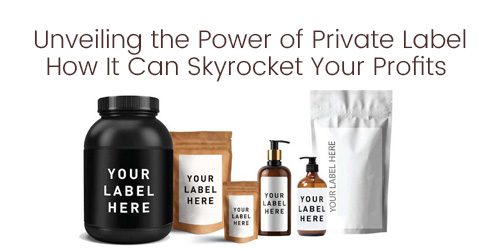Unveiling the Power of Private Label: How It Can Skyrocket Your Profits
Are you ready to unlock the secret to skyrocketing your profits and leaving your competition in the dust? Look no further, because we’re about to unveil the power of private label products. Whether you’re a small business owner or an entrepreneur looking for new avenues of success, this blog post will take you on a journey through the untapped potential that private label can offer. Get ready for an eye-opening exploration into how this game-changing strategy can revolutionize your business and pave the way for unprecedented growth. Buckle up and get ready to witness your profits soar like never before!
Mlm products can be a great way to differentiate your business from the competition and give you a competitive edge. By creating a unique line of products that are branded with your name, you can create an exclusive and highly desirable product offering. This can help to build customer loyalty and trust, while also generating greater profits for your business. Additionally, customizing existing products in order to create something entirely unique to your brand has become increasingly popular as a way of boosting sales and profits.
Introduction to Private Label
As an ecommerce business owner, it’s important to be aware of the different types of products that you can sell in order to make the most profit. One type of product that can be extremely profitable is a private label product.
Private label products are those that are manufactured by one company but sold under another company’s brand. For example, a private label product could be a shirt that’s manufactured by Company A but sold under the brand name of Company B.
There are many benefits to selling private label products. First, it allows you to create your own unique product without having to worry about the manufacturing process. Second, it gives you more control over your branding and marketing since you’re not relying on the manufacturer to promote your product. Third, private label products typically have higher profit margins than other types of products since you’re not paying for things like advertising and packaging.
If you’re interested in selling private label products, there are a few things you need to keep in mind. First, make sure you choose a reliable manufacturer who has experience in producing high-quality goods. Second, create a strong branding strategy for your product so that it stands out from the competition. And third, don’t forget to price your product competitively so that customers are willing to pay for it!
Benefits of Private Label for Companies
Private label products are those manufactured by one company but sold under another company’s brand. Also known as white-label products, private label products are created with the retailer or distributor’s needs in mind.
There are several benefits of private label for companies. Perhaps the most obvious is increased profits. By selling products under their own brand, retailers and distributors can mark up the price to maximize profits.mlm product manufacturer also offer greater control over branding and marketing initiatives. And because private label products are often seen as higher quality than generic or store brands, they can help build customer loyalty.
Another benefit of private label for companies is the ability to customize product offerings. Retailers and distributors can work with manufacturers to create products that meet the specific needs of their customers. This level of customization is often not possible with national brands.
Private label products can give companies a competitive edge in today’s marketplace. With so many choices available to consumers, being able to offer unique, high-quality products can be a major differentiator.
Advantages of Choosing Private Label Products
There are many advantages of private label products, which is why this type of product has been growing in popularity. When you choose a private label product, you can be sure that you’re getting a high-quality product since the manufacturer has a reputation to uphold. In addition, private label products usually come at a lower price point than branded products, so you can save money while still getting a great product.
Another advantage of private label products is that they often have longer shelf lives than branded products. This means that you can stock up on these items and not have to worry about them going bad before you have a chance to use them. Private label products also tend to be more unique than branded products, so you can offer your customers something different that they’re likely to appreciate.
Finally, private label products can help you build your brand. When you offer private label products, your customers will associate your business with the product and they’ll come to know and trust your brand. This can be a great way to increase loyalty and build your reputation as a reliable provider of quality products.
Strategies for Implementing a Successful Private Label Model
If you’re looking to implement a successful private label model, there are a few key strategies you’ll need to follow. First and foremost, it’s important that you choose the right product to private label. This means finding a product that is in high demand and has low competition. Once you’ve found the perfect product, the next step is to create a branding strategy. This includes choosing a catchy name and creating a professional logo for your private label products.
Next, you’ll need to develop a marketing strategy to get your products in front of potential buyers. This can be done through online marketing channels such as social media and search engine optimization. Additionally, consider setting up an eCommerce website where customers can purchase your products directly. Make sure you offer excellent customer service so that buyers will keep coming back for more!
Finally, you’ll need to ensure that your private label skin care manufacturers is compliant with the law. This includes making sure that any claims made on packaging or advertising are backed up by relevant evidence and that all ingredients are labeled correctly. With these strategies in place, you’ll be well on your way to a successful private label model!
Challenges and Pitfalls of Private Label
When it comes to private label products, there are both challenges and pitfalls that business owners need to be aware of.
One of the biggest challenges is that private label products can be very expensive to develop and produce. This is because businesses need to invest in both the product itself and the packaging. In addition, private label products often have minimum order requirements that can make them cost-prohibitive for small businesses.
Another challenge is that private label products can be difficult to market and sell. This is because they lack the brand recognition of more well-known brands. As a result, businesses need to put in extra effort to promote their private label products.
One of the biggest pitfalls of private label products is that they can be copycats of existing products. This is because many businesses simply copy the design and packaging of popular products instead of developing their own unique product. As a result, private label products can be perceived as inferior to the original product.
Tips for Maximizing the Potential of Your Private Label Brand
1. Start with a strong foundation: Make sure your private label brand has a solid foundation to build on. This includes having a well-defined target audience, a clear brand identity, and strong positioning in the market.
2. Create compelling content: Your private label brand’s content must be compelling and relevant to your target audience. It should be designed to educate, inform, and entertain your customers and prospects.
3. Build an engaged community: An engaged community is essential to the success of any private label brand. Use social media, email marketing, and other channels to connect with your customers and encourage them to interact with your brand.
4. Promote your brand aggressively: Private label brands need aggressive promotion to succeed. Use traditional and digital marketing channels to get the word out about your brand and drive traffic to your website or online store.
5. Measure and adjust: Be sure to measure the performance of your private label brand regularly and make adjustments as needed. This will help you ensure that your brand is on track and achieving its goals.
Private label products are rapidly becoming the go-to choice for businesses looking to maximize their profits. With more and more companies leveraging private label strategies, there’s no better time than now to get in on the action. By understanding the power of private labeling and how it can be used effectively, you can capitalize on this growing trend and stand out from your competition. Get started today and start seeing a boost in your sales figures!
The potential benefits of private labeling are numerous and varied. Not only can you benefit from higher profit margins, but also the improved brand recognition that comes with a well-crafted private label product. You can develop a more personal relationship with your customers by creating a unique product that speaks to their individual needs. Additionally, the cost savings associated with private labeling are impossible to ignore. By taking the time to carefully consider all of these factors, you can ensure that your own private label strategy will be an effective one and result in greater profits for your business.



